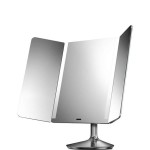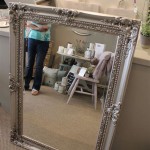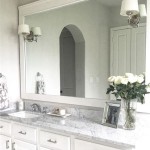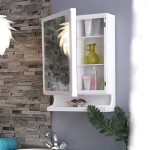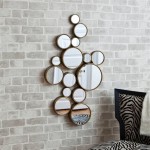How Much Does a Wall Mirror Weigh?
Determining the weight of a wall mirror involves considering various factors, from the size and thickness of the glass to the frame material and mounting hardware. This article explores the different elements contributing to a mirror's overall weight and provides estimations for common mirror types.
Factors Influencing Mirror Weight
Several key factors play a role in determining the weight of a wall mirror:
- Glass Thickness: Thicker glass panes contribute significantly to the overall weight. Common thicknesses range from 3mm to 6mm, with thicker options used for larger mirrors to prevent warping.
- Mirror Size: Larger mirrors naturally weigh more due to the increased surface area and corresponding glass volume.
- Frame Material: Frame materials range from lightweight options like plastic and aluminum to heavier materials like wood and metal. Ornate, heavily carved frames will add considerable weight.
- Backing Material: Some mirrors feature a backing material for added stability and safety. This can range from thin cardboard to thicker wood or composite materials.
- Mounting Hardware: While relatively small, the mounting hardware, including brackets, screws, and chains, also contributes to the total weight.
Estimating the Weight of Common Mirror Types
Providing precise weight figures is challenging without specific dimensions and materials. However, the following estimations offer a general guide for common mirror types:
- Small Decorative Mirrors (Under 12" x 12"): These mirrors, often featuring lightweight frames or no frame at all, typically weigh between 1 and 5 pounds.
- Medium-Sized Bathroom Mirrors (24" x 36"): A standard bathroom mirror with a simple frame can weigh between 10 and 20 pounds.
- Large Full-Length Mirrors (30" x 60"): These mirrors, often with thicker glass and potentially heavier frames, can range from 25 to 50 pounds or more, depending on the specific design.
- Oversized Decorative Mirrors (Over 48" x 48"): Large, decorative mirrors with elaborate frames can weigh considerably more, potentially exceeding 100 pounds.
Importance of Accurate Weight Estimation
Accurately estimating a mirror's weight is crucial for several reasons:
- Safe Installation: Knowing the weight ensures the use of appropriate wall anchors and mounting hardware to support the mirror securely, preventing accidents and damage.
- Wall Suitability: Certain wall types, like drywall, may not be suitable for heavier mirrors without additional support.
- Shipping and Handling: Weight information is essential for calculating shipping costs and determining the appropriate handling methods.
Finding the Exact Weight
Several methods can help determine the precise weight of a specific mirror:
- Check Product Specifications: Many manufacturers provide weight information in the product specifications or on the packaging.
- Contact the Manufacturer or Retailer: If the weight is not readily available, contacting the manufacturer or retailer directly is a reliable option.
- Weighing the Mirror: If the mirror is accessible, using a bathroom scale or other weighing device is the most accurate method.
Weight Considerations for Different Frame Materials
Frame materials impact both the aesthetics and weight of a wall mirror:
- Wood Frames: Wood offers a classic and versatile look but can add significant weight, especially with ornate or thicker frames.
- Metal Frames: Metal frames, such as aluminum or steel, offer durability and a sleek appearance. Weight varies depending on the type and thickness of the metal.
- Plastic Frames: Plastic provides a lightweight and often more affordable option, ideal for smaller or lighter mirrors.
- Frameless Mirrors: Mirrors without frames offer a minimalist aesthetic and reduce the overall weight, making them suitable for various wall types.
Safe Handling and Installation Practices
Handling and installing heavy mirrors requires careful planning and execution:
- Seek Assistance: Enlist the help of another person when handling larger or heavier mirrors to prevent strain and accidents.
- Use Proper Lifting Techniques: Lift with the legs, not the back, and avoid twisting motions.
- Ensure Secure Mounting: Use appropriate wall anchors and mounting hardware specifically designed for the mirror's weight and the wall type.
- Follow Manufacturer Instructions: Always refer to the manufacturer's instructions for specific installation guidelines.
Considerations for Antique or Vintage Mirrors
Antique or vintage mirrors may present unique weight considerations:
- Thicker Glass: Older mirrors often feature thicker glass than modern equivalents, contributing to increased weight.
- Elaborate Frames: Antique mirrors may have intricately carved or heavy frames made from materials like solid wood or metal.
- Potential Deterioration: Age and deterioration can affect the structural integrity of the frame and backing, requiring extra care during handling and installation.

Modern Contemporary Wall Mirror Overall Weight 30 Lb 32 H X W Com

Sbc Decor Catherine 33 X 48 Wall Mounted Light Weight Resin Mir Us Bath

Wallbeyond 20 In W X H Light Weight Aluminum Round Metallic Gold Wall Mirror Contemporary Thin Profile 345207 The Home Depot

Sbc Decor La Rue 46 X 28 Wall Mounted Light Weight Resin Mirror Us Bath

Wallbeyond 32 In W X H Light Weight Aluminum Round Metallic Gold Wall Mirror Contemporary Thin Profile 345209 The Home Depot

Aluminum Modern Contemporary Wall Mirror 30 H X 18 W Overall Weight 24 Lb Com

Buy Black Silver Mirrors For Home Kitchen By Chronikle Ajio Com

Wall Mirror Denmark Model

Buy Black Pink Mirrors For Home Kitchen By Chronikle Ajio Com

Sbc Decor Catherine 33 X 48 Wall Mounted Light Weight Resin Mir Us Bath

